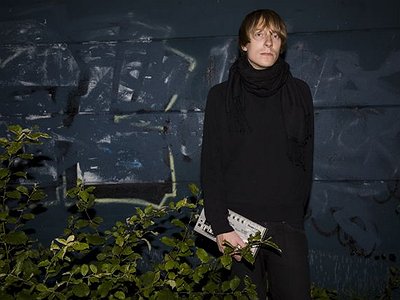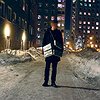Part 1
Name: Andreas Tilliander
Nationality: Swedish
Occupation: Producer
Current Release: Acidub on Kontra
Selected Bands/Projects: Mokira, TM404
Musical Recommendations: The most important artists in Sweden at the moment are more than two but also one. They call themselves Drömfakulteten and it’s a collective of people who don’t define themselves as men. They make weird electronic experiments but also music that reminds me of pop.
When did you start writing/producing music - and what or who were your early passions and influences?
I had the pleasure and privilege to grow up in a neighborhood where we were a good many who were interested in the same things. When I was really small it was breakdancing, then it became skateboarding. Shortly thereafter every kid got into martial arts and synth music.
The whole community of kids skated around, listened to Depeche Mode, Kraftwerk, The Cure, Pet Shop Boys and so on. Some of the older guys bought an Emax sampler and suddenly there were a couple of bands in Hässleholm, the tiny southern city where I spent my teens.
I was still too young to make anything myself, but I was a big fan of those who played at the youth center. Bought their demo cassettes and t-shirts. Stefan Thor played in a band called Morticians and even though the age difference was quite huge at the time, we became friends. He became my combined mentor and idol and nowadays we’ve released three vinyls together as a duo called Kondens.
For most artists, originality is first preceded by a phase of learning and, often, emulating others. What was this like for you? How would you describe your own development as an artist and the transition towards your own voice?
When I was very young, I was heavily inspired by the likes of Depeche Mode, Nitzer Ebb and D.A.F. This was in the beginning of the nineties, when I’d just discovered I had a liking in making my own music rather than playing instruments. I also had a period of trying to sound like Aphex Twin, Autechre and the other players in the Warp Records team. Then I discovered Basic Channel and although I have to say I never did do anything that sounds like the BC productions, they became very important for my recordings and my well being.
I remember reading reviews of my first Mokira album on Raster-Noton in the year 2000 and some of them were about my dub influences. A few even mentioned Basic Channel. Still to this day, I’m super infuenced by dub, be it jamaican or german. Some years ago, I listened more to house music than ever before (or after) but people would still speak about the dubby elements. I’m doomed and I love it.
What were your main compositional- and production-challenges in the beginning and how have they changed over time?
When I was about twelve or so, I purchased an Amiga 500 from a friend at school. He asked me if I wanted some floppies with various games too, but I declined. I was very determined to make my own music rather than spending time playing games. After ordering disks with various tracker programs like Noisetracker and Soundtracker, I started making something that was almost reminiscent of music. This was in the early nineties and in Sweden at that time, we had a hotline where people would call to find someone to sex chat with. It was called Heta Linjen and I would call that number and play my music very loud just because I wanted someone to hear it. I remember one day someone started shouting “Turn that damn techno off!” and I got super happy and thought “I’ve made it, I finally did a techno track and nobody noticed it was amateurish!”.
The first addition to my computer studio was a Roland Juno-1 and the analog delay / spring reverb Aria Locobox, which I purchased when I was 14 years old in 1992. I still have that echo and I’ve even named a track after it. Then things got serious and within a few years I had some Akai samplers, an E-mu Emax, the Korg MS series and so on. At that time, I made the most common mistake people do when building a studio - it’s more fun to purchase stuff that generates sounds rather than what affects it. Meaning I had lots of synths and drum machines, but very few reverbs and delays. Everything went into a shitty mixer too.
Tell us about your studio, please. What were criteria when setting it up and how does this environment influence the creative process? How important, relatively speaking, are factors like mood, ergonomics, haptics and technology for you?
At the very end of the previous millennium, computer programs had became very impressive again. The Swedish company Propellerhead had put out the Rebirth software that emulated the most important tools for acid house - The Roland TB-303, TR-808 and TR-909. I remember installing it on the computer at my art school and got blown away. Later on they also introduced Reason, which was a full blown studio. I started to sell my analog gear and purchased a super expensive computer instead. I made my very first album using Sonic Foundry SoundForge which isn’t a studio in any way whatsoever. It was a sound editor and it took forever to sculpt your music that way, but I loved it. Using that program, I could make music which wasn’t possible with my analog studio. I then went on to working with the free tracker program Jeskola Buzz. I made my Raster-Noton album and the three albums on Mille-Plateaux / Force Inc using that program with samples from my analog gear.
[Read our feature on the Roland TR-909]
[Read our feature on the Roland TB-303]
What are currently some of the most important tools and instruments you're using?
Those who’ve followed my recordings will probably not be surprised when I say Roland TB-303. It’s bass synthesizer released in the early eighties and flopped dramatically. The idea was that the tiny silver box would serve as a bass player when you sat with your home organ or did some licks on your Stratocaster. The sound that comes out of the machine are anything but bass. It sounds hollow and trippy and there are few people, if any, that can actually make it sound like you want. Incredibly shifty and the finest instruments I know.
I use the TB in every track I record nowadays. Sometimes hidden in layers of filters and effects, but also as the main melody. Effects is super important too and I know a lot of people see me as a hardware only type of guy, but that’s not really the full story. Although I mainly record using my synths, the overall processing in Ableton is very important. I’ve got tons of old echo machines from the seventies, lo-fi digital ones from the eighties, excellent reverbs from the nineties as well as currect pedals from Strymon and Eventide and they all add to what is me. If I could only work with one piece of gear though, it would be the sampler Octatrack from Elektron. No doubt about it.
Many contemporary production tools already take over significant parts of what would formerly have constituted compositional work. In which way do certain production tools suggest certain approaches, in which way do they limit and/or expand your own creativity? Are there any promising solutions or set-ups capable of triggering new ideas inside of you as a composer?
I’m one of those producers that need mistakes and errors in order to compose. That’s one of the things I really dig with the 303 and 202. I can never make it play the melodies I want, but the machines have better ideas than me. The Sequentix Cirklon is another important composition tool for me. It’s a hardware sequencer that is super fast to work with AND it’s easy to come up with basses and chords I wouldn’t have played using a keyboard. In the computer world I really love what Skinnerbox is building for MaxForLive. Again, what I dig about the Skinnerbox instruments is the “errors” they decide for me.






